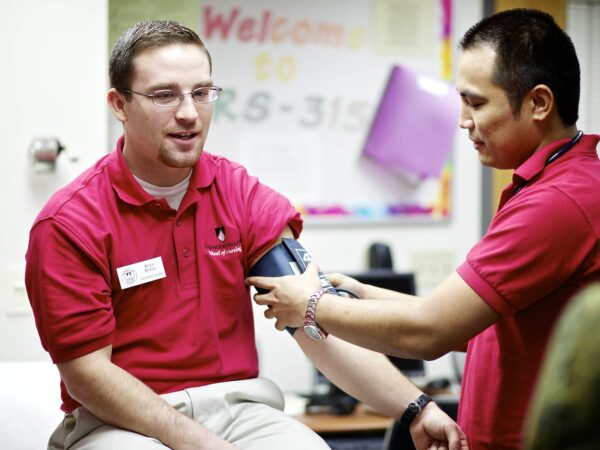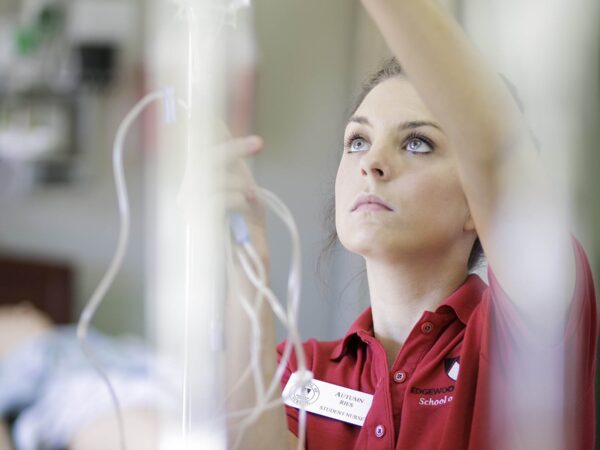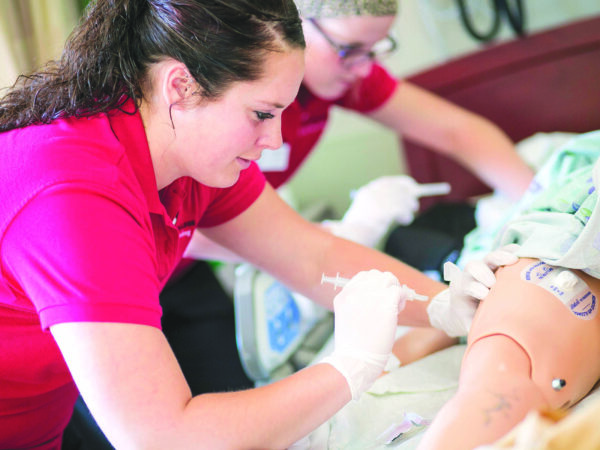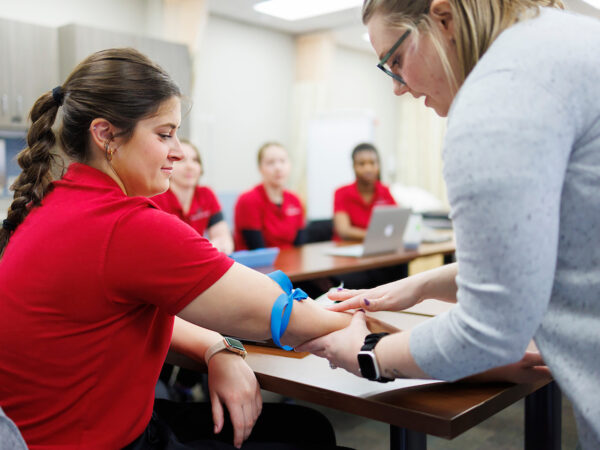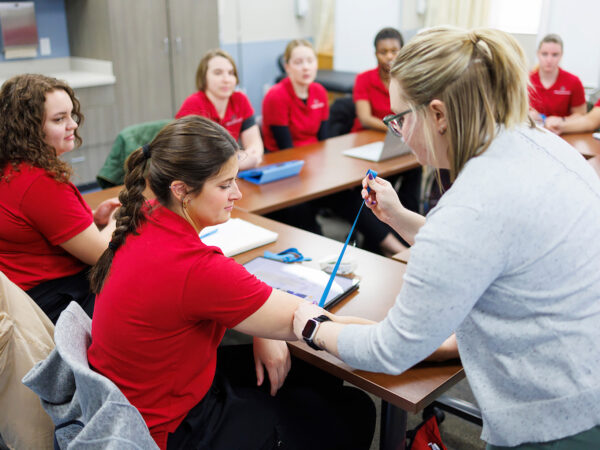Doctor of Nursing Practice:Executive LeadershipHenry Predolin College of Health Sciences
The Doctor of Nursing Practice (DNP) degree emphasizes the highest level of education in order to prepare experts in specialized advanced nursing roles. The DNP offered by Edgewood University is in indirect care (Executive Leadership). Graduates of this program bring the best practices to managing health services, having competence in care systems management, and providing evidence-based care and translational research methods.
A rounded curriculum will include: preparation in epidemiology, biostatistics, healthcare finance, informatics, and quality management, a DNP capstone project, and a customized practicum experience (500-1000 hours based on previous practicum experience in a master’s program).
Global
Virtual
30
January 20, 2026
Join us for our DNP Information Session
Learn more about the DNP program at Edgewood University. We’ll discuss program, courses, application, and your questions. Register for an online session below:
- No sessions currently. Please reach out to gps@edgewood.edu.
All sessions are in Central Daylight Time
Doctor of Nursing Practice (DNP)-Executive Leadership
- 30 Total credits
- Completed in 2 years (Full Time)
- Full or part time options
- Fully online
Doctor of Nursing Practice: Executive Leadership Full Time Sample Course Schedule
Featured Courses
A minimum of 30 credits are required for the DNP in Executive Leadership degree. Additional coursework beyond the 30-credit requirement may be necessary to meet all of the Essentials of doctoral education for advanced practice in leadership.
NRS 802A – Intro DNP: Role, Residency, Project
In this two-course sequence (NRS 802A and 802B), students will self-assess and reflect upon their individual strengths and opportunities for executive leadership development. In collaboration with the course instructor, action plans for professional growth during the DNP program are established. In the online seminar portion, students will virtually attend weekly seminars and participate in a multitude of didactic activities. Students will explore foundations of the DNP degree and the DNP role. Students will also work with the course professor to identify preceptors to design their residency experience; culminating in the accumulation of 1000 hours of residency towards the DNP degree. Finally, students will work with the course professor to develop a relevant clinical problem/issue as the foundation for the DNP scholarly project, complete an outline of the DNP scholarly project, and draft a review of literature to support the DNP scholarly project.
NRS 810 – Population Health and Health Policy
Population health is explored to critically examine epidemiological statistics on determinants of health; and strategies to promote health, reduce health risks at multiple levels, and promote a culture of health among diverse populations. Students will be challenged to consider the socioeconomic impact of the cost of health care, advance equitable population health policy, engage in advocacy, and advance their knowledge of preparedness in order to protect population health during disasters and public health emergencies.
NRS 830 – Health Systems Informatics
Examining the optimization of information management and communication to improve the health of populations, communities, families, and individuals. Frameworks include regulatory, legislative, workflow, electronic health record, billing, and telehealth. Application in professional development, translational research, and bioinformatics (genomics) are explored.
Accreditation
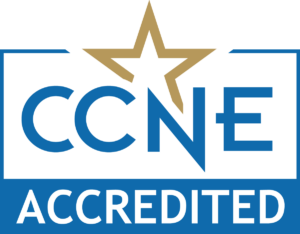
The Doctor of Nursing Practice (DNP) – Executive Leadership degree at Edgewood University is accredited by the Commission on Collegiate Nursing Education (CCNE), 655 K Street NW, Suite 750, Washington, DC 20001, 202-887-6791. The program is also approved by the State of Wisconsin Board of Nursing.
Frequently Asked Questions
What are the admission requirements for this program?
New students may begin the Doctor of Nursing Practice (DNP) in Executive Leadership program in the fall, spring or summer semesters. Candidates seeking admission to Edgewood University’s DNP program must meet the following eligibility requirements:
- Graduated with a baccalaureate degree from a nursing program accredited by a national nursing accreditation body and received at least a 3.3 GPA on a 4.0 scale from an accredited master’s degree program.*
- A graduate statistics course completed in the last three years is strongly recommended before admission, but is absolutely required by the end of the first semester in the DNP program (unless a graduate statistics course was successfully completed as part of a master’s degree conferred within the last three years)
- Hold a current registered nursing license
- Practiced for a minimum of one year as a Registered Nurse in the United States (preferred)
- Will complete an interview with the program Graduate Admissions and Progression Committee
BSN-prepared candidates may be considered for the DNP program by first successfully completing the MSN degree
*BSN-prepared candidates with a master’s degree in a discipline other than nursing may also be considered for admission. If a candidate’s master’s degree is not an MSN, his/her program of study will be evaluated for coursework that prepares him/her for DNP study. Non-MSN candidates may be asked to submit a portfolio of professional practice that highlights their knowledge, skills, and application of the MSN Essentials (i.e., research, health care policy, ethics, role development, foundations of nursing, human diversity and social issues, and health promotion). These students are often required to enroll in additional coursework prior to beginning the DNP program.
What is the application process like for this program?
Candidates for the DNP program apply using this application. Only completed applications will be reviewed by the School of Nursing for admission consideration. A completed application includes the following items:
- Complete DNP application
- Official post-secondary transcripts from all institutions attended
- Reason for Study Essay
- Express your professional objectives and how Edgewood University’s DNP program will contribute toward your role as a nursing leader
- Describe an issue related to quality of practice or healthcare system improvement you are considering for your DNP project (preliminary ideas)
- Three letters of recommendation
- Two letters must come from nursing colleagues (at least one from a supervisor) that can address potential competency in graduate level studies
- One letter should come from a former faculty member from your MSN program who is qualified to evaluate academic competence for doctoral study
- Curriculum vitae or resume
- A scholarly writing sample that best exemplifies your writing and composition skills (this can be a sample from your master’s program)
- Proof of licensure (required) and certification (optional)
- International students must submit TOEFL scores.
Once applicants successfully complete the online application, they will receive an email request to submit additional materials (transcripts, essay, letters of recommendation, resume, and licenses) directly to Edgewood University.
**Note application process exception for candidates who already have an Edgewood University MSN: Those who have earned an MSN from Edgewood University within the past 3 years and received at least a 3.3 GPA are guaranteed admission into the DNP program upon application. If a candidate has not met the minimum 3.3 GPA requirement, he/she must apply and meet for an interview to be considered for admittance.
Application Deadlines:
- August 1st for Fall
- January 1st for Spring
- May 1st for Summer
What are the goals for this program?
At the end of the program, graduates will:
- Integrate scientific findings from nursing, biopsychosocial fields, genomics and genetics, public health, quality improvement, and organizational sciences for the continual improvement of nursing and health care across diverse settings.
- Conceptualize new care delivery models based on contemporary nursing science, organizational and systems leadership that are feasible within current organizational, political, cultural, and economic perspectives.
- Translate new science, its application and evaluation; as well as generate evidence through their practice to guide practice improvements.
- Use information systems/technology to support and improve patient care and healthcare systems.
- Analyze the policy process and engage in politically competent action at the institutional, local, state, regional, federal, and international levels through the interface between practice, research, and policy.
- Establish, participate and assume leadership in interprofessional teams to accomplish safe, timely, effective, efficient, equitable, and patient-centered care in complex environments.
- Analyze epidemiological, biostatistical, occupational, and environmental data in the development, implementation, and evaluation of clinical (disease and illness) prevention and population health.
- Demonstrate assessment and base practice on the application of biophysical, psychosocial, behavioral, sociopolitical, cultural, economic, and nursing science as appropriate in their area of specialization (leadership).
- Attain skills in human resource management, strategic planning, accounting principles, healthcare finance, healthcare economics, and other facets of leading operations within organizational mission, vision and regulatory requirements.
In addition to the aforementioned goals, all DNP Graduates may be prepared to sit for national specialty certifications in several options below. Additional individual review and study will be necessary for successful completion of any of these exams:
- Nurse Executive (NE-BC), or Nurse Executive, Advanced (NEA-BC) as determined by the American Nurses Credentialing Center (ANCC)
- Informatics certification
- Certified Nurse Manager & Leader (CNML), or Certified Executive Nursing Practice (CENP) as determined by the American Organization for Nursing Leadership (AONL)
Are there any health requirements for this program?
Before entering the Nursing Practicum or Advanced Practice Clinical courses, students must provide evidence of meeting the health requirements for the agency in which they complete the Practicum or Advanced Practice Clinical.
